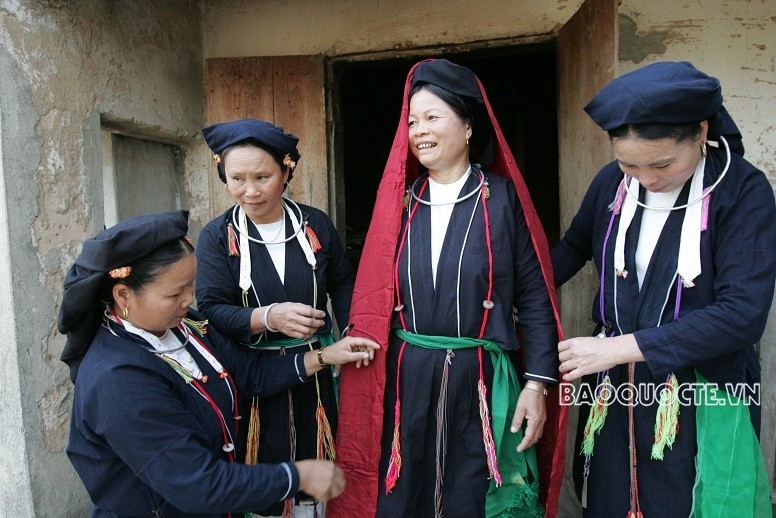The report “Figures on Ethnic Minority Women and Men in Viet Nam 2015-2019,” along with the “Policy Brief: Gender issues in ethnic minority areas in Vietnam,” was launched in celebration of the International Day of the World’s Indigenous Peoples on August 9.
The report was conducted by the UN Entity for Gender Equality and the Empowerment of Women (UN Women) with financial support from the Embassy of Ireland in Viet Nam, and in coordination with the Institute of Labour Science and Social Affairs under the Ministry of Labour, Invalids and Social Affairs (ILSSA-MOLISA), and the Department of Ethnic Minority Affairs - Committee for Ethnic Minority Affairs (CEMA).
According to the report, the percentage of ethnic minority households with access to the internet (Wi-Fi, cable, or 3G) increased 9.4 times from 6.5 percent in 2015 to 61.3 percent in 2019, while the average income per capita per month of ethnic minorities in 2018 increased by 1.8 times in four years, and the average monthly income per capita of ethnic minority female-led households was always higher than that of male-led households.

The proportion of children attending school at the right age increased by 15.2 percent from 2015 to 2019; and the percentage of ethnic minority people participating in health insurance reached 93.5 percent with no difference between men and women.
The two publications cover information on ethnic minority women and men in Viet Nam for the period of 2015-2019, including gender analysis outcomes and providing policy recommendations for gender equality promotion in ethnic minority areas in the country.
Data in the reports were analysed based on the findings of the Survey on the Socio-economic Situation of the 53 Ethnic Minority Groups in Viet Nam, which was conducted by the General Statistics Office in collaboration with CEMA in 2015 and 2019.
There are seven main topics: population; infrastructure and assets; labour, employment, and income; education and training; culture and society; health, environment, and sanitation; and ethnic minority cadres and civil servants.
The reports also highlight persistent gender issues in ethnic minority and mountainous areas which are affecting women and girls.
For instance, while the overall rate of child and consanguineous marriage among the 53 ethnic minority groups has reduced, the extent of reduction was uneven and has continued to increase among a number of ethnic minority groups.
The analysis found that female ethnic minority workers are more likely to undertake insecure jobs and are more vulnerable in the workplace than their ethnic minority male and Kinh female counterparts.
Also, while the percentage of ethnic minority women aged 10-49 who give birth at health facilities reached 86.4 percent, it remains significantly lower than that of Kinh women which is over 99 percent.
Bui Ton Hien, Director of ILSSA-MOLISA said that in ethnic minority communities, women and girls are often more disadvantaged in accessibility to opportunities and resources due to social norms which impose an inferior position to them, limit them within birth delivery and household production activities.
Meanwhile, Luu Xuan Thuy, Director of Ethnic Minority Affairs Department under the CEMA highly appreciated UN Women’s technical contribution and believed that gender equality analyses in ethnic minority areas are fundamental information and useful for the stakeholders in designing policies and intervention programmes to ensure that ethnic minority women are not left behind in the country’s sustainable development process.
Elisa Fernandez Saenz, UN Women Representative in Viet Nam said that the objective of the reports is to provide stakeholders with a clearer picture on the current gender equality situation in ethnic minority areas in Viet Nam, wherein gender issues are being well addressed by the government, but which needs further effort for intervention in both areas of policy and programme.
She emphasised that gender equality issues which intersect with ethnicity are often difficult to tackle and require a comprehensive approach, as well as commitments of financial investment in the coming years.
“UN Women believes that these reports shall contribute to filling the gap of gender statistics among ethnic minority groups in Viet Nam, and to the progress of promoting socio-economic and sustainable development in ethnic minority areas,” she said.
For her part, Lisa Doherty, Deputy Head of Development at the Embassy of Ireland in Viet Nam said that Ireland believes it is critical to empower and support women and their communities.
The Embassy of Ireland’s partnership with UN Women aims to ensure that the government's ethnic minority policies and programming - support for which has always been a central pillar of Ireland’s engagement in Viet Nam - include appropriately strong attention to gender considerations and prioritise women's empowerment, she added.





















